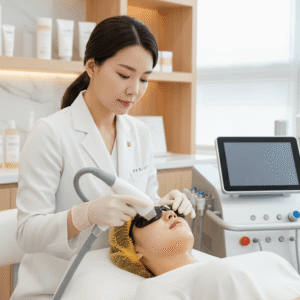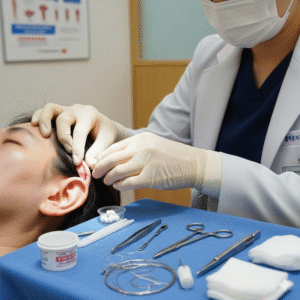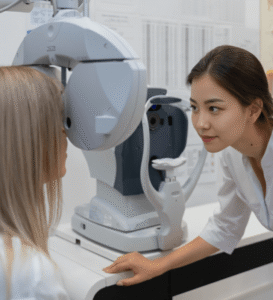Overview
Tay-Sachs disease is a rare, inherited genetic disorder that progressively destroys nerve cells in the brain and spinal cord. It is caused by a deficiency of the enzyme hexosaminidase A (HEXA), leading to the accumulation of a fatty substance called GM2 ganglioside in neurons. This buildup causes severe neurological deterioration over time. While Tay-Sachs disease is rare globally, advanced genetic testing and neonatal screening programs in South Korea enable early diagnosis and management, providing families with critical information and supportive care options.
What is Tay-Sachs Disease?
Tay-Sachs disease is an autosomal recessive disorder, meaning a child must inherit two defective copies of the HEXA gene—one from each parent—to manifest the condition. The enzyme deficiency impairs the breakdown of GM2 gangliosides in nerve cells, leading to progressive neurodegeneration. The disease is classified into forms based on age of onset and severity:
- Infantile Tay-Sachs: The most common and severe form, with onset at 3–6 months
- Juvenile Tay-Sachs: Symptoms appear between 2–10 years of age and progress more slowly
- Adult/late-onset Tay-Sachs: Rare form with milder neurological symptoms, appearing in adolescence or adulthood
In South Korea, genetic counseling and enzyme assays are used to identify carriers and affected individuals, aiding early intervention and family planning.
Symptoms
Symptoms vary by form of Tay-Sachs disease but typically involve progressive neurological decline:
Infantile form:
- Loss of motor skills such as crawling or sitting
- Muscle weakness and decreased reflexes
- Exaggerated startle response to noise
- Seizures and developmental delays
- Vision and hearing loss
- “Cherry-red spot” visible on the retina during eye examination
Juvenile and adult forms:
- Cognitive decline and learning difficulties
- Muscle weakness and coordination problems
- Speech difficulties
- Psychiatric symptoms in some adult-onset cases
- Gradual loss of mobility and independence
Early recognition of these symptoms in South Korea allows for supportive care, symptom management, and genetic counseling for families.
Causes
Tay-Sachs disease is caused by mutations in the HEXA gene located on chromosome 15. These mutations lead to a deficiency or complete absence of the hexosaminidase A enzyme. Without this enzyme, GM2 gangliosides accumulate within neurons, disrupting normal cellular function and causing progressive neurodegeneration.
The disease is inherited in an autosomal recessive pattern, meaning:
- Both parents must carry one copy of the defective gene
- Each child has a 25% chance of being affected, a 50% chance of being a carrier, and a 25% chance of being unaffected
In South Korea, carrier screening, prenatal testing, and genetic counseling are available to at-risk families.
Risk Factors
Risk factors for Tay-Sachs disease include:
- Having both parents as carriers of the HEXA mutation
- Family history of Tay-Sachs disease or other lysosomal storage disorders
- Certain ethnic populations have higher carrier rates globally, although in Korea it remains rare
- Consanguinity may increase risk due to shared genetic heritage
Genetic counseling in South Korea helps families understand these risks and make informed reproductive decisions.
Complications
Tay-Sachs disease leads to severe and progressive neurological complications:
- Loss of motor skills and mobility, often leading to paralysis in infantile cases
- Severe cognitive impairment and inability to communicate in advanced stages
- Seizures and epilepsy, sometimes difficult to control
- Vision and hearing loss
- Respiratory infections due to weakened muscles, which can be life-threatening
- Premature death, usually in early childhood for the infantile form
Supportive care in South Korea focuses on minimizing complications and improving quality of life for affected children and families.
Prevention
While there is no cure for Tay-Sachs disease, prevention involves genetic strategies:
- Carrier screening: Identifying carriers through enzyme assays and genetic testing
- Prenatal testing: Chorionic villus sampling or amniocentesis to detect affected fetuses
- Preimplantation genetic testing: For couples undergoing in vitro fertilization
- Genetic counseling: Educating at-risk families about inheritance patterns and reproductive options
South Korean medical centers provide comprehensive genetic counseling and testing services for families concerned about Tay-Sachs disease.
Treatment Options in Korea
There is currently no cure for Tay-Sachs disease, and treatment focuses on supportive care to manage symptoms and improve quality of life:
Diagnosis:
- Enzyme assay to measure hexosaminidase A activity
- Genetic testing to identify HEXA mutations
- Prenatal and neonatal screening programs
Medical Treatments:
- Anticonvulsants for seizure control
- Medications for muscle spasms and pain management
- Nutritional support and supplementation to prevent malnutrition
Supportive Care:
- Physical and occupational therapy to maintain mobility
- Speech therapy to assist communication
- Respiratory therapy for airway management
- Palliative care to provide comfort in advanced stages
Research and Advanced Interventions:
- Experimental therapies, including gene therapy, enzyme replacement therapy, and substrate reduction therapy, are being explored in clinical trials worldwide
- South Korea participates in global research collaborations to improve future treatment options
Through multidisciplinary care, South Korean healthcare providers aim to optimize symptom management, support families, and offer counseling for future reproductive planning.













